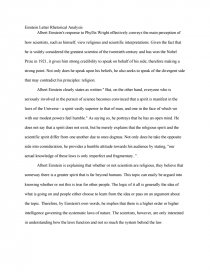Albert Einsteins Letter Rhetorical Analysis
Essay by Greek • August 28, 2011 • Case Study • 341 Words (2 Pages) • 12,718 Views
Einstein Letter Rhetorical Analysis
Albert Einstein's response to Phyllis Wright effectively conveys the main perception of how scientists, such as himself, view religious and scientific interpretations. Given the fact that he is widely considered the greatest scientist of the twentieth century and has won the Nobel Prize in 1921, it gives him strong credibility to speak on behalf of his side; therefore making a strong point. Not only does he speak upon his beliefs, he also seeks to speak of the divergent side that may contradict his principles: religion.
Albert Einstein clearly states as written " But, on the other hand, everyone who is seriously involved in the pursuit of science becomes convinced that a spirit is manifest in the laws of the Universe - a spirit vastly superior to that of man, and one in the face of which we with our modest powers feel humble." As saying so, he portrays that he has an open mind. He does not say that a spirit does not exist, but he merely explains that the religious spirit and the scientific spirit differ from one another due to ones dogmas. Not only does he take the opposite side into consideration, he provides a humble attitude towards his audience by stating, "our actual knowledge of these laws is only imperfect and fragmentary..".
Albert Einstein is explaining that whether or not scientists are religious, they believe that someway there is a greater spirit that is far beyond humans. This topic can easily be argued into knowing whether or not this is true for other people. The logic of it all is generally the idea of what is going on and people either choose to learn from the idea or pass on an argument about the topic. Therefore, by Einstein's own words, he implies that there is a higher order or higher intelligence governing the systematic laws of nature. The scientists, however, are only interested in understanding how the laws function and not so much the system behind the law.
...
...
